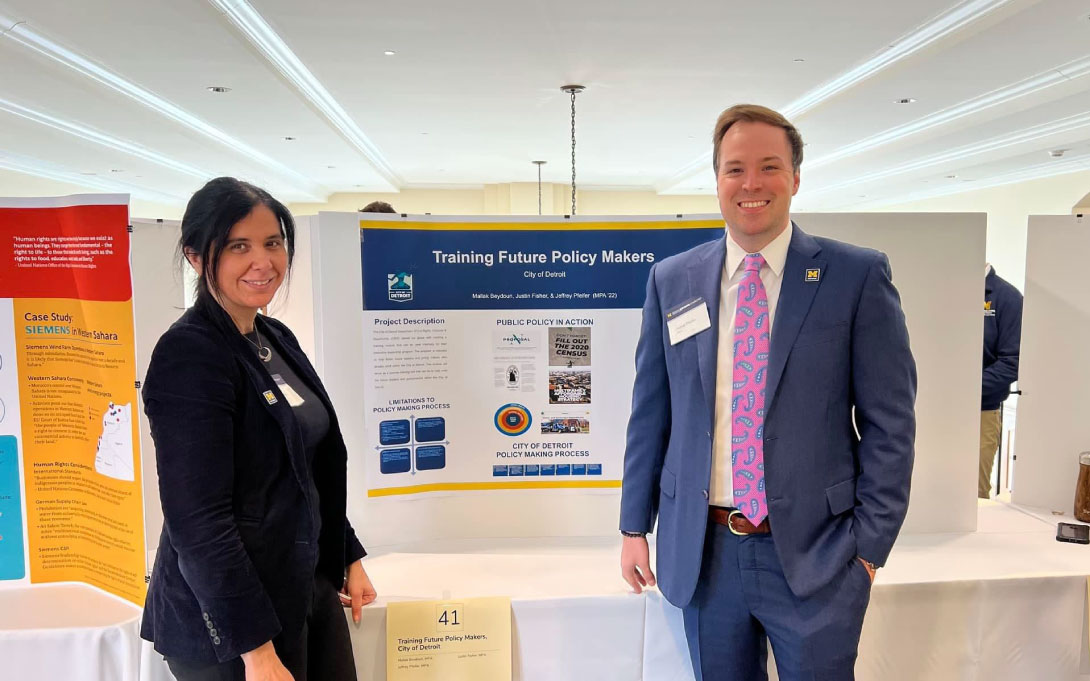
When Mallak Beydoun (MPA ‘22) and Jeff Pfeifer (MPA ‘22) met at the Ford School, they quickly bonded over their shared government and campaign experience. Although they have different political perspectives, they continue to collaborate post-graduation.
Beydoun had over a decade of experience building coalitions, managing public sector projects, and leading Detroit Mayor Mike Duggan’s reelection campaigns. She sought a mid-career program that would complement her extensive experience in the government sector. Now, Beydoun serves in dual capacities as a senior executive–Special Projects with the City of Detroit and senior policy advisor with SustainabiliD, providing strategic counsel and implementation support on numerous sustainability-related projects.
Pfeifer had extensive experience working in the Michigan state legislature, consulting, and managing campaigns, and was seeking additional policy education tailored to professionals with real-world experience. He is now the director of public affairs at Harbor Strategic Public Affairs, where he consults on issue advocacy, coalition building, legislative strategy, and public relations.
They share their experience at the Ford School, and what it takes to communicate and work together across differences in a polarized political climate.
- How did the two of you meet at the Ford School?
Jeff Pfeifer: Mallak and I first connected during orientation. She was the first MPA student I spoke with at the Ford School, and we ended up in many classes together. Our friendship blossomed quickly, fueled by our shared backgrounds in campaigns and legislation. Despite our differing political experiences—hers predominantly with Democrats and mine with Republicans—we found common ground and many shared or similar experiences.
Mallak Beydoun: Our first collaboration arose with the City of Detroit project, marking an immediate success. We worked with staff from the City of Detroit to create a training guide for future policymakers, which was featured at the 15th Annual Gramlich Showcase. Post-graduation, our collaboration persisted, extending beyond professional projects to maintain a close friendship.
- How did your experience change how you approach your work or shift your perspective?
MB: It was refreshing to meet people at the Ford School who didn't judge others based on political leanings. In today's polarized political climate, it's easy to label everyone as either far left or far right. However, this experience taught me that we have more similarities than differences, and working together on projects helped us to appreciate those commonalities. It was a valuable lesson that taught me to approach everything with an open mind and without preconceived notions or prejudices.
- Do you still work on projects together?
MB: We have collaborated on several public affairs projects and often rely on each other for professional advice, as well as various introductions to people within our own respective networks.
- Why is the ability to listen and talk across differences so important right now?
JP: It seems like we’ve lost a sense of civility and decorum in today’s political climate. The zealots on both sides of the aisle are making the most noise, creating further discourse. I think folks need to remember that you can have different political and policy views, but that doesn’t necessarily mean that people with opposing views are “wrong”, or that you can’t have a friendship or positive relationship.
- What are the important ingredients for a successful collaboration, particularly when people are coming from seemingly opposing viewpoints?
JP: A fundamental aspect is fostering openness to diverse opinions and viewpoints. Acknowledging that each individual brings a unique perspective and skill set is crucial. Our distinct backgrounds brought different viewpoints and parallel skill sets to the collaboration. We engaged in a constructive dialogue, aligning on goals and devising effective strategies, leveraging our shared 'X's and O's' approach to planning and execution.
On a broader scale, bringing together opposing viewpoints often yields the best outcomes, fostering compromise and communication—something that is severely lacking in the current political and public policy landscape
- Why should someone mid-career consider going back to school?
MB: In the ever-evolving job market, improving our skills through further education is essential to stay relevant. Beyond professional growth, returning to school can help personal fulfillment; additionally, the Ford school environment presents networking opportunities that can be instrumental in personal and professional development, and this was the case for Jeff and me.
JP: I would also add that one of the greatest benefits I experienced from the Ford School was the faculty and alumni. They truly care about your professional growth and want to help you grow and succeed. Professor Liz Gerber and Cindy Bank truly went above and beyond to help us, both inside and outside the classroom.